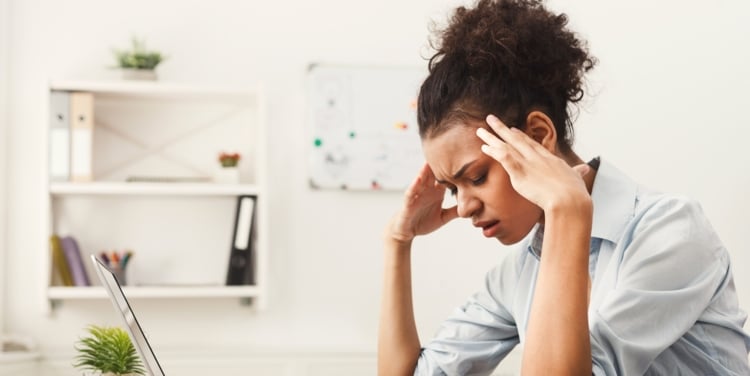Headache or migraine before period can be quite annoying and unpleasant, especially if it lasts even throughout the period itself. What are the possible causes of headache before period and during it? Let’s find out.
-
Tracking cycle
-
Getting pregnant
-
Pregnancy
-
Help Center
-
Flo for Partners
-
Anonymous Mode
-
Flo app reviews
-
Flo Premium New
-
Secret Chats New
-
Symptom Checker New
-
Your cycle
-
Health 360°
-
Getting pregnant
-
Pregnancy
-
Being a mom
-
LGBTQ+
-
Quizzes
-
Ovulation calculator
-
hCG calculator
-
Pregnancy test calculator
-
Menstrual cycle calculator
-
Period calculator
-
Implantation calculator
-
Pregnancy weeks to months calculator
-
Pregnancy due date calculator
-
IVF and FET due date calculator
-
Due date calculator by ultrasound
-
Medical Affairs
-
Science & Research
-
Pass It On Project New
-
Privacy Portal
-
Press Center
-
Flo Accuracy
-
Careers
-
Contact Us
A Headache Before Period vs. a Headache During Period: Are They The Same Symptom?

Every piece of content at Flo Health adheres to the highest editorial standards for language, style, and medical accuracy. To learn what we do to deliver the best health and lifestyle insights to you, check out our content review principles.
Headache before period
Many women experience headaches due to changes in their hormones. The majority of women who get migraines notice a link with their periods. These so-called "menstrual migraines" tend to be especially severe.
There are several types of headaches that are linked with your period. Some women can get their menstrual headache before period, while others once their period starts.
Menstrual headaches before period are linked to changing levels of the hormones estrogen and progesterone. Some other factors might be at play, including genetics and dietary triggers.
Periods are not the sole trigger of hormonal headaches. Other causes may include oral contraceptives, hormone replacement therapy, and pregnancy.
Luckily, there’s a wide range of medications and other treatments that help relieve your bad headache before period. Women who suffer from a headache before period often find relief during pregnancy or upon reaching menopause
Take a quiz
Find out what you can do with our Health Assistant
Causes of headache before period
Your migraine before period is most likely linked to the hormone estrogen. This female hormone controls the brain chemicals that affect headache-related chemicals in the brain. When you’re experiencing a headache, this means that there’s a drop or change in estrogen levels.
There’s a wide range of reasons for the change in hormone levels, including:
- Menstrual cycle. Prior to your period, estrogen and progesterone fall to their lowest levels.
- Pregnancy. During the first trimester, estrogen levels rise quickly, then level out. Because of this, many women notice that their migraines get better or go away after their third month of pregnancy.
- Hormone replacement therapy. The hormones that women take during a replacement therapy can also set off headaches.
- Menopause and perimenopause. During the years leading to menopause, women have more headaches due to the fluctuating hormone levels. Many women say that their migraines become less severe as they reach menopause.
Can headaches before period be a sign of pregnancy?
Many women have a hard time figuring out if they are pregnant, have PMS, or are about to start their period. The symptoms are similar and include:
- mood swings
- back pain
- tender breasts
- headaches
Although there are similar signs and symptoms, there are unique differences between each.
You will know that you’re about to start your period if you’re experiencing the following symptoms:
- headache
- fatigue
- acne
- joint pain
- peeing less
- constipation
- lack of coordination
- increased appetite
- cravings for chocolate, salt, or alcohol
There are symptoms that only occur if you are pregnant, including:
- mild spotting
- nausea
- vomiting
- cramping
- missed or late period
- vaginal discharge
- darkening or enlargement of the areola or nipple
The best way to find out if you are pregnant is with a pregnancy test. You can find home pregnancy test kits at pharmacies and most grocery stores.

How to manage bad headache before period
Being female comes with its own struggles, especially when it comes to headaches. Fortunately, there's help.
Over-the-counter pain relievers can be of great help. They may soothe your pain soon after your headache begins.
Triptans are another option. You might feel their effects 2 hours after you take them.
You can also try acupuncture. This ancient Chinese practice may lower the number of tension headaches you get and could prevent a migraine before period.
Many women also report using biofeedback. Biofeedback may relieve your headaches by helping you monitor how your body responds to stress. Apart from biofeedback, you can also try relaxation techniques.
Sometimes, holding an ice pack to the painful area is the best solution. Simply wrap the ice pack in a towel in order to protect your skin.
Headache during period
There are two types of women. Those who report a severe headache before period, and those who have strong headaches during their period.
A bad headache during period is not unusual, and it may partly be due to the drop in the hormone estrogen that happens before you menstruate.
The main symptoms of a hormonal headache is a headache or a migraine. You will feel a throbbing pain that starts on one side of the head. You may also experience sensitivity to light and nausea or vomiting.
Causes of headache during period
The main trigger might be the drop in the hormone estrogen that happens before you menstruate.
Birth control pills can worsen the symptoms of a migraine. Your estrogen levels plummet and your headaches get worse when you take placebo pills or no pills at all, during the week of your period. If you’re prone to headaches, taking birth control pills that have low amounts of estrogen or only progestin may help.
Genetics are also thought to play a role. Women who have a headache during period tend to have a combination of factors that trigger their headaches.
Menopause and perimenopause are also one of the main causes of a bad headache during period. This is due to the fluctuating hormone levels.
Further causes might include:
- skipping meals
- getting too much or too little sleep
- intense lights, sounds, or smells
- severe weather changes
- alcoholic beverages, especially red wine
- too much caffeine or caffeine withdrawal
Ways to manage bad headache during period
- There are several ways to relieve a bad headache during period:Your doctor might recommend over-the-counter pills to help with your severe symptoms.
- Prescription drugs are another possible remedy for a bad headache during period.
- Certain vitamins and supplements have been shown to relieve headaches. They might include riboflavin, magnesium, and coenzyme Q10
- Regular exercise.
- Staying hydrated is essential, as well as eating nutritious meals.
- You can also try reducing stress. Try relaxation techniques like progressive muscle relaxation, guided imagery, and breathing exercises
Headache after period: what can it tell you about?
Women can suffer from three types of headaches: a headache before period, a headache during period, and a headache after period.
If you experience a headache after period, it may be due to high levels of stress, dehydration, and genetic or dietary triggers. However, a headache after period may also be due to hormonal imbalances and low iron levels.
A headache after period can be accompanied by:
- nausea
- vomiting
- sharp, violent throbbing
- painful pressure behind the eyes
- extreme sensitivity to bright lights and sound
The symptoms usually fade away with a proper rest or sleep. However, you can try certain treatments to help minimize the pain of headaches after your period. These treatments include cold compresses, over-the-counter drugs, lots of fluid, and vitamin supplements.


Hey, I'm Anique
I started using Flo app to track my period and ovulation because we wanted to have a baby.


The Flo app helped me learn about my body and spot ovulation signs during our conception journey.


I vividly
remember the day
that we switched
Flo into
Pregnancy Mode — it was
such a special
moment.
Real stories, real results
Learn how the Flo app became an amazing cheerleader for us on our conception journey.




